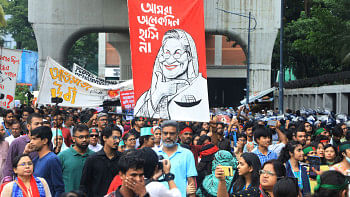IS or not, how does it matter?
Bangladesh is a success story in counterterrorism. Our performance in stymieing the phenomenon from taking a pervasive form, like the kind we witness obtaining in a few of the regional countries, has been acknowledged by the international community. And even without being a part of the international bandwagon of the so-called global war on terror, we have successfully combated the physical manifestation of extremism and terrorism in the country.
This country in the last three decades has been the target of many extremists groups that wanted to sponsor and create sympathisers for their cause and indeed to set up a base for their ranks here. The extremist groups that have germinated here have stemmed from causes quite germane to this country but not without influence generated by developments in other parts of the globe.
That we have successfully prevented the widespread expansion of the phenomenon physically is demonstrated by the preemptive actions carried out successfully by the security forces in the last six or seven years which have prevented a repetition of the incidents of August 2004 and 2005. However, we had warned in this very column several years ago that the fact that there have been no major terror attacks in the country since 2005 is no reason to be euphoric that the extremists have been quashed. Admittedly, they have been in the process of reorganisation and that they retain a degree of operational and intelligence capability as the ambush of the police vehicle carrying JMB operatives in February last year demonstrates.
On the other hand, we may have not been as successful in preventing their ideological inroads into the country. Arrests of potential Jihadists in the last one year indicate that the narratives of the extremists are perhaps striking a sympathetic chord amongst some of the youths in this country.
Extremism has come into focus again, this time hogged by the issue of whether the dastardly killing of two foreigners have anything to do with the direct association of the extremist group, Islamic State. We are informed that the government had forewarning that foreigners may be targeted in this country -- the reason, we presume, why the Australian cricket tour was called off. Whether the Australians shared the intelligence with Bangladesh we don't know, the Americans surely did. And in spite of the actions the government had taken, two unfortunate citizens of two countries very friendly to Bangladesh, nonetheless, fell to the bullets of the killers whose motives, other than to precipitate a situation in the country, remain to this day, unclear.
A tenuous claim purportedly by IS has confounded the situation. And the killings and the claim of association has changed the strain of the government's position on the issue of IS and religious extremism in general. Whereas not in the very distant past we had been made to believe that the country was pervaded by religious extremists, we are now told such a state no longer exists now. I say this to highlight, once again, the consequences of not looking at a thing in the correct perspective. And this was amply highlighted in the roundtable that this newspaper organised on 6 Oct, on the issue of extremism, the details of which appears in the opposite page.
It is important to understand the consequences of downplaying and overplaying the issue of extremism and terrorism. The consequences of such an attitude were brought out long ago and I cannot resist quoting what this very column carried as a part of an article on February 11, 2010 in this regard. The relevant portion of the article said, "The issue of terrorism has been addressed differently at different times in our country, varying from a position of complete denial of the existence of terrorist or underplaying the threat, as was done during the erstwhile 4-party alliance regime, to overplaying the issue in a manner which gave the impression to a less informed person that the country was saturated with terrorists, as was done during the initial period of the current government's rule. Neither is close to reality. And none of the extreme positions help because, apart from the diluting the issue, it prevents the expression of appropriate methodologies to fight terrorism, particularly those that are motivated by religious ideologies."
There seems to be a panic denial overdrive. And IS has predominated all our thinking and utterances. While it is essential to eliminate IS link without dismissing outright the possibility of their existence in this country, it is also essential to identify and nab the perpetrators keeping our mind open to all the possible motives for the killings.
No investigation will yield results if conducted with a closed mind. Accepting the presence of extremist groups or their sympathiser does not discredit a country. On the other hand not recognising their existence may prove harmful to the state, as we have seen to our discomfort.
The writer is Associate Editor, The Daily Star.

 For all latest news, follow The Daily Star's Google News channel.
For all latest news, follow The Daily Star's Google News channel. 



Comments